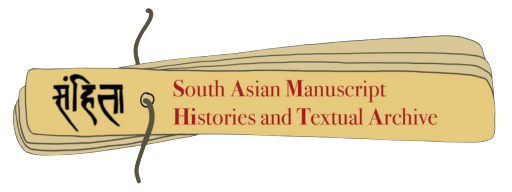Manuscripts
Search Filter
Kāvyaprakāśa
112409_V014A_4187_CS Language : Sanskrit Scripts : Devanagari
An alaṁkāra text extened into 10 chapters (ullāsas) by Mammaṭa upto Parikarālaṁkāra in chapter 10th and the rest by Alaka or Allaṭa, who some claim wrote some earlier parts as well. The commentator Govinda Ṭhakkura was belongs to the Ravikara family in Mithila. He was the eldest son of son of Keśava and Sonodevī, and elder brother of poet Śrīharṣa and Rucikara. He was patronised by Bhavānanda Rāya (1450 CE). This is a complete manuscript with an incomplete text. It has 2nd ullāsa upto 2.4
Mukundamālā
112410_V015A_4188_CS Language : Sanskrit Scripts : Devanagari
A stotra text, salutation to Lord Nārāyaṇa by Kulaśekharabhūpa, a Cera king, who some claims probably identical with Kulaśekhara Ālvār. Gopīdāsa completed the copy in the shop of Rādhādāmodar jī, which is near Rāsamaṇḍala (in Jaunpur near Banaras) on Tuesday in the light half of Bhādrapada (Aug-Sept) 1874 CE.
Viṣayatāvāda
112425_V021A_4189_CS Language : Sanskrit Scripts : Devanagari
A Nyāya text on the nature and relation of the contents of perfective knowledge by Raghudeva Nyāyālaṃkāra Bhaṭṭācārya. This work derives from Gūḍhārthadīpikā.
Naiṣadhacarita
112426_V025A_4193_CS Language : Sanskrit Scripts : Devanagari
A mahākāvya in 22 cantos. based on Nala and Damayantī story from the Mahābhārata episode (upto the marriage). by Śrīharṣa (12th century CE). According to tradition, it is among the best five mahākāvyas. He is said to be the son of Śrīhīra and Māmalladevī. He was patronized by the King of Kānyakubja. This manuscript has 5th canto only.
Naiṣadhacarita
112431_V026A_4194_CS Language : Sanskrit Scripts : Devanagari
A mahākāvya in 22 cantos. based on Nala and Damayantī story from the Mahābhārata episode (upto the marriage). by Śrīharṣa (12th century CE). According to tradition, it is among the best five mahākāvyas. He is said to be the son of Śrīhīra and Māmalladevī. He was patronized by the King of Kānyakubja. This manuscript has 1st canto only with the commentary Naiṣadhīyaprakāśa by Nārāyaṇa Beḍarakara (1400-1637 CE) His parents was Narasimha Paṇḍita Beḍarakara and Madālasā. Nārāyaṇa was disciple Rāmeśvara and Sītā.
Nītiśataka
112432_V027A_4195_CS Language : Sanskrit Scripts : Devanagari
A 100 verses text on worldly wisdom by Bhartṛhari. This work is a part of his Subhāṣitatriśatī or Śatakatraya, which is the collection of verses divided into three sections, each of which has more or less 100 verses.
Pāṇinīyaṣoḍaśakārikā
112434_V028A_4196_CS Language : Sanskrit Scripts : Devanagari
A 16 stanza Sanskrit grammar text on denotation of words nd that of the case-relation, the work is attributed to Pāṇini. It has a commentary Ṣoḍaśakārikāvyākhyā but the name of the commentator is missing.
Paribhāṣāpāṭha
112436_V029A_4197_CS Language : Sanskrit Scripts : Devanagari
A Sanskrit grammar text on grammatical rules of Pāṇini, explained the formation of words by Pāṇini. K.V. Abhyankar explained it as "the removal of conflict between two rules which occur simultaniously in the process of the formation of words, (padasiddhi)"
Rāmāyaṇavidhi
112437_V031A_4199_CS Language : Sanskrit Scripts : Devanagari
This is a ritual text with reference to, among others, the Rāmāyaṇa, and proper way to read the text with Hindu rituals.
Śṛṅgāraśataka and Vairāgyaśataka
112443_V033A_4201_CS Language : Sanskrit Scripts : Devanagari
This manuscript has two different śataka kāvyas of Bhartṛhari. Śṛṅgāraśataka describes the passionate love, passionate encounters between lovers and erotics on the other hand Vairāgyaśataka explains renunciation of worldly attachments and inspires to live a spiritual life.
Ekādaśīnirṇaya
112445_V034A_4202_CS Language : Sanskrit Scripts : Devanagari
This work describes the importance of Ekādaśī, the important monthly fast day. Sacred to Lord Viṣṇu. Composed in 126 verses, refers different Purāṇas and Kalpasūtras.
Vṛttadarpaṇa
112447_V035A_4203_CS Language : Sanskrit Scripts : Devanagari
Text on metrics by Maithilaśrībhāṣya. The Vṛttadarpaṇa is relatively rare text. It is a complete manuscript with an incomplete text, it has only third chapter.













